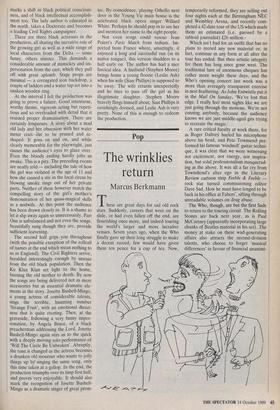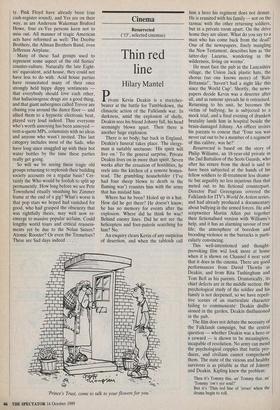Pop
The wrinklies return
Marcus Berkmann
These are great days for sad old rock stars. Suddenly, careers that were on the slide, or had even fallen off the end, are flourishing once more, and indeed touring the world's larger and more lucrative venues. Seven years ago, when the Who finally gave up their long struggle to make a decent record, few would have given them ten pence for a cup of tea. Now,
temporarily reformed, they are selling out four nights each at the Birmingham N'EC and Wembley Arena, and recently com- pleted a 42-date tour of the US which made them an estimated (i.e. guessed by a tabloid journalist) £26 million.-
Which isn't bad for an outfit that has no plans to record any new material or, in fact, continue in any form at all after the tour has ended. But then artistic integrity for them has long since gone west. The traditional lure of enormous cheques has rather more weight these days, and the Who's opening concert last week was a more than averagely transparent exercise in nest-feathering. As John Entwistle put it in the Mail On Sunday, 'We've lost that edge. I really feel most nights like we are just going through the motions. We're not conning anybody, because the audience knows we are just middle-aged gits trying to recreate the magic.'
A rare critical faculty at work there, for as Roger Daltrey hurled his microphone above his head, and Pete Townsend per- formed his famous 'windmill' guitar techni- que, it was clear that we were witnessing not excitement, nor energy, nor inspira- tion, but solid professionalism masquerad- ing as the above. It was all a far cry from Townshend's alter ego in the Literary Review cartoon strip Feeble & Feeble rock star turned commissioning editor Dave Sad. How he must have longed to be back in his office at Fabers', sifting through unreadable volumes on drug abuse.
The Who, though, are but the first Sads to return to the touring circuit. The Rolling Stones are back next year, as is Paul McCartney (apparently incorporating large chunks of Beatles material in his set). The money at stake on these wad-generating affairs also attracts the second-division talents, who choose to forget 'musical differences' in favour of financial unanimi- ty. Pink Floyd have already been (cue cash-register sound), and Yes are on their way, as are Anderson Wakeman Bruford Howe, four ex-Yes persons keen not to miss out. All manner of tragic American acts have reformed as well: The Doobie Brothers, the Allman Brothers Band, even Jefferson Airplane.
Many of these Sad groups used to represent some aspect of the old Sixties' counter-culture. Naturally the late Eight- ies' equivalent, acid house, they could not have less to do with. Acid house parties have resuscitated many of their once strongly held hippy dippy sentiments that everybody should love each other, that hallucinogenic drugs are a good thing, and that giant aubergines called Trevor are chasing you around the dance floor — and allied them to a hypnotic electronic beat, played very loud indeed. Thus everyone who's worth annoying has been annoyed — rent-a-quote MPs, columnists with no ideas and anyone who wasn't invited. This last category includes most of the Sads, who have long since snuggled up with their hot water bottles by the time these parties really get going.
So will we be seeing these tragic old groups returning to replenish their building society accounts on a regular basis? Cer- tainly the Who would be foolish to split up permanently. How long before we see Pete Townshend ritually smashing his Zimmer frame at the end of a gig? What's worse is that pop stars we hoped had vanished for good, who had grasped the obscurity that was rightfully theirs, may well now re- emerge to massive popular acclaim. Could lengthy world tours and critical reassess- ments yet be due to the Nolan Sisters? Atomic Rooster? Or even the Tremeloes?
These are Sad days indeed . .
`Prince's Trust, come to talk to your flowers for you.'



























































 Previous page
Previous page